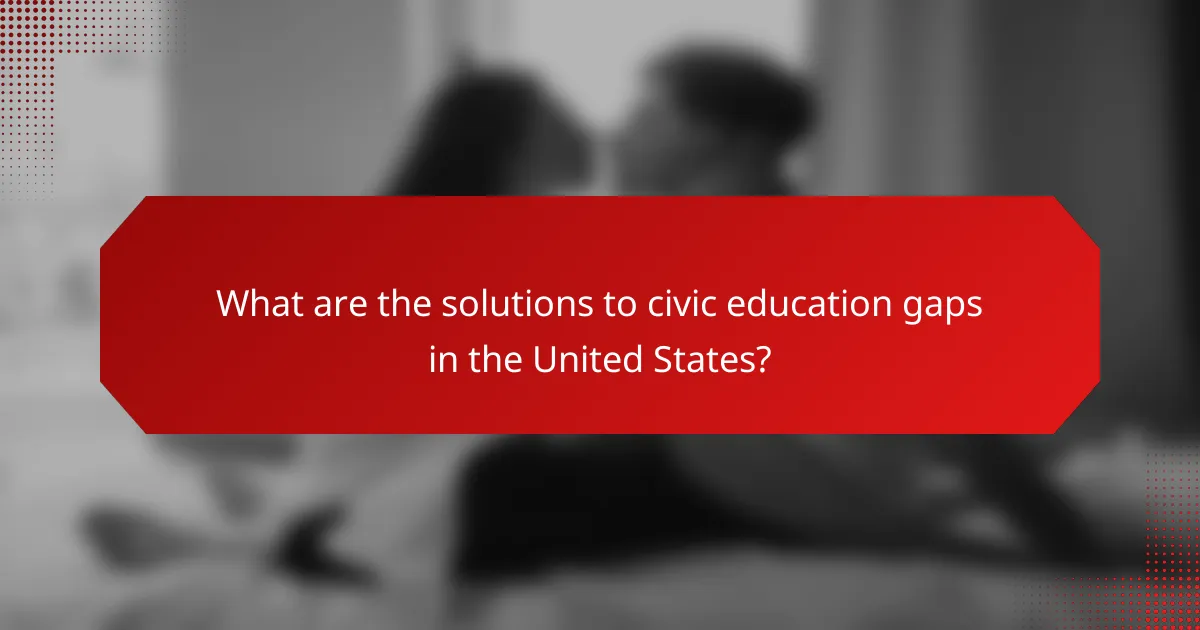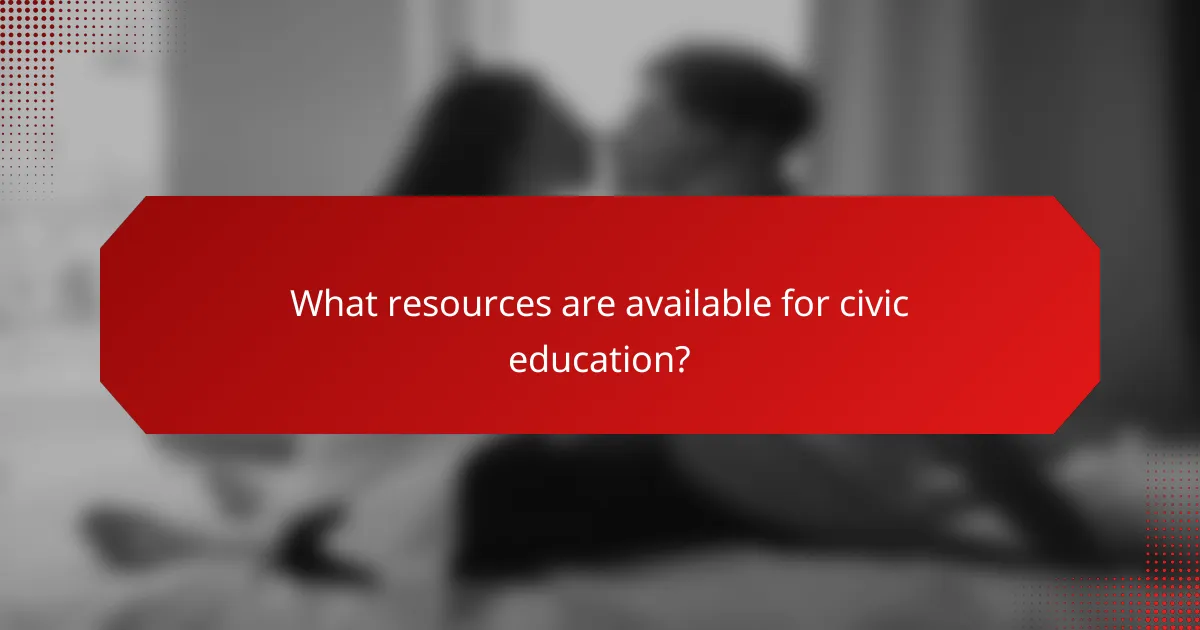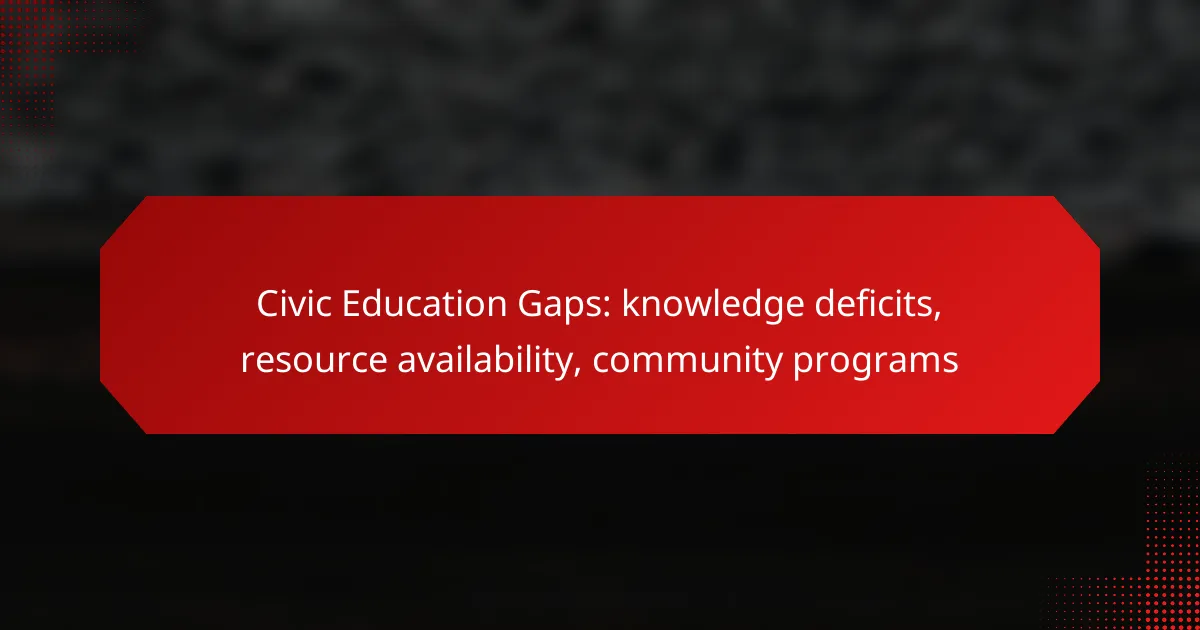Civic education gaps in the United States highlight the need for improved curricula and increased resource availability to empower citizens. By fostering community engagement and leveraging diverse resources, such as online courses and local partnerships, we can address knowledge deficits and encourage active participation in democracy. Community programs play a crucial role in providing accessible experiences that enhance understanding of civic responsibilities and governance.

What are the solutions to civic education gaps in the United States?
Addressing civic education gaps in the United States involves enhancing curricula, fostering community engagement, leveraging online resources, and forming partnerships with local organizations. These strategies aim to improve knowledge deficits and resource availability, ultimately empowering citizens to participate more actively in democracy.
Enhanced curriculum integration
Integrating civic education into existing curricula ensures that students receive consistent exposure to civic knowledge throughout their schooling. This can include embedding civic topics in subjects like history, social studies, and even science, making the learning process more relevant and engaging.
Schools can adopt frameworks such as the C3 Framework for Social Studies State Standards, which emphasizes inquiry-based learning and critical thinking. This approach encourages students to analyze civic issues and develop informed opinions, preparing them for active citizenship.
Community engagement initiatives
Community engagement initiatives connect students with local civic activities, fostering a sense of responsibility and participation. Programs like youth councils or civic forums allow students to engage with local government and community leaders, providing real-world contexts for their learning.
Schools can collaborate with local governments to create service-learning projects that address community needs. This hands-on approach not only enhances civic knowledge but also builds strong community ties and encourages students to contribute positively to society.
Online resource platforms
Online resource platforms offer accessible tools and materials for both educators and students to enhance civic education. Websites like iCivics provide interactive games and lesson plans that make learning about government and civic responsibilities engaging and fun.
Additionally, platforms can host webinars and virtual discussions featuring experts in civic education, allowing for broader participation and knowledge sharing. Schools should encourage students to utilize these resources to supplement their classroom learning.
Partnerships with local organizations
Forming partnerships with local organizations can significantly enhance civic education by providing additional resources and expertise. Nonprofits focused on civic engagement can offer workshops, guest speakers, and mentorship programs that enrich students’ understanding of civic responsibilities.
Schools should seek to collaborate with organizations like the League of Women Voters or local civic groups to create programs that align with educational goals. These partnerships can also help secure funding and resources to support civic education initiatives in schools.

How can community programs improve civic education?
Community programs can significantly enhance civic education by providing accessible resources and hands-on experiences that foster understanding of civic responsibilities. These initiatives often bridge knowledge gaps and encourage active participation in local governance.
After-school programs
After-school programs play a crucial role in improving civic education by offering structured activities that engage students in discussions about their rights and responsibilities. These programs can include debates, mock elections, and community service projects that promote civic engagement.
For effective after-school initiatives, it’s essential to align activities with local civic issues and involve community leaders as guest speakers. This approach not only enriches the curriculum but also helps students connect theoretical knowledge with real-world applications.
Workshops and seminars
Workshops and seminars provide targeted learning opportunities that can deepen understanding of civic processes and community involvement. These events often cover topics such as voting rights, local government functions, and advocacy strategies, making them valuable for participants of all ages.
To maximize impact, workshops should be interactive and include practical exercises, such as role-playing or case studies. Collaborating with local organizations can enhance these programs by providing expert facilitators and relevant resources, ensuring participants leave with actionable knowledge.

What resources are available for civic education?
Various resources exist to enhance civic education, including government-funded materials, nonprofit organization offerings, and online courses. These resources aim to bridge knowledge gaps and improve community engagement in civic matters.
Government-funded educational materials
Government-funded educational materials provide structured content designed to promote civic knowledge. These resources often include textbooks, lesson plans, and multimedia tools that align with national education standards.
Schools and educators can access these materials through local education agencies or government websites. It’s essential to review the materials for relevance and adaptability to specific community needs.
Nonprofit organization resources
Nonprofit organizations play a crucial role in civic education by offering a variety of resources, including workshops, seminars, and printed materials. Many nonprofits focus on specific civic topics, such as voting rights, community service, or local governance.
Engaging with these organizations can provide communities with tailored programs that address local issues. Consider reaching out to local nonprofits for partnerships or resource sharing to enhance civic education efforts.
Online courses and webinars
Online courses and webinars offer flexible learning opportunities for individuals interested in civic education. These platforms often feature expert-led sessions covering a range of topics, from civic engagement strategies to understanding government functions.
Many online resources are free or low-cost, making them accessible to a wide audience. When selecting courses, look for those that provide interactive elements or community discussions to enhance learning and engagement.

What are the knowledge deficits in civic education?
Knowledge deficits in civic education refer to the gaps in understanding essential civic concepts, government operations, and civic responsibilities. These deficits can hinder effective participation in democratic processes and limit community engagement.
Lack of understanding of government functions
A significant knowledge deficit in civic education is the lack of understanding of how government functions at various levels. Many individuals are unaware of the roles and responsibilities of local, state, and federal governments, which can lead to disengagement from civic duties.
For example, citizens may not know how to access local government services or understand the process of voting and its importance. This lack of knowledge can result in lower voter turnout and reduced participation in community decision-making.
Insufficient civic engagement practices
Insufficient civic engagement practices contribute to knowledge deficits by failing to provide opportunities for individuals to participate in civic activities. Many communities lack programs that encourage active involvement, such as town hall meetings or civic workshops.
To improve civic engagement, communities should implement initiatives that educate residents about their rights and responsibilities. Simple practices like organizing community forums or providing resources on how to contact elected officials can enhance civic knowledge and participation.

How do civic education gaps affect communities?
Civic education gaps can significantly hinder community engagement and democratic participation. When individuals lack knowledge about their rights and responsibilities, it leads to reduced involvement in civic activities and decision-making processes.
Reduced voter participation
One of the most immediate effects of civic education gaps is reduced voter participation. Many citizens may not understand the voting process, including registration requirements and how to cast their ballots, which can lead to lower turnout rates during elections.
For instance, communities with limited access to civic education resources often see voter turnout drop by significant margins compared to those with robust educational programs. This can create a cycle where the lack of participation further diminishes the perceived importance of voting.
Lower civic involvement
Civic education gaps also contribute to lower levels of civic involvement beyond voting. Individuals may feel disconnected from local governance and community initiatives, leading to fewer people attending town hall meetings or participating in local organizations.
Without a solid understanding of civic duties and community roles, residents may miss opportunities to engage in discussions that affect their lives. Encouraging local programs that promote civic knowledge can help bridge these gaps and foster a more active citizenry.

What are the prerequisites for effective civic education programs?
Effective civic education programs require a clear understanding of community needs, collaboration with educational institutions, and access to adequate resources. These elements ensure that programs are relevant, engaging, and capable of fostering informed and active citizenship.
Community needs assessment
A community needs assessment identifies the specific civic education gaps within a community. This process involves gathering data through surveys, interviews, and focus groups to understand the knowledge deficits and interests of community members.
Key steps include analyzing demographic information, assessing existing civic knowledge, and determining the resources available for education. Engaging local stakeholders can provide insights into the unique challenges and opportunities present in the community.
Collaboration with educational institutions
Collaboration with educational institutions enhances the effectiveness of civic education programs by leveraging existing resources and expertise. Schools, colleges, and universities can provide valuable support in curriculum development and access to trained educators.
Partnerships can take various forms, such as joint workshops, shared resources, or co-hosted events. These collaborations help ensure that civic education is integrated into formal education systems, making it more accessible to a broader audience.

What emerging trends are shaping civic education?
Emerging trends in civic education focus on enhancing engagement and understanding through innovative methods and resources. Key developments include the integration of digital citizenship education, which prepares individuals to navigate online spaces responsibly and effectively.
Digital citizenship education
Digital citizenship education equips learners with the skills needed to participate safely and responsibly in the digital world. This includes understanding online etiquette, recognizing misinformation, and protecting personal data. As technology becomes increasingly integral to civic life, these skills are essential for informed participation.
Effective digital citizenship programs often incorporate interactive elements such as simulations, discussions, and real-world applications. For instance, students might engage in projects that analyze social media campaigns or participate in online forums that address civic issues. Such hands-on experiences foster critical thinking and responsible online behavior.
To implement digital citizenship education, educators should prioritize relevant content and practical examples. Resources like the International Society for Technology in Education (ISTE) standards can guide curriculum development. Additionally, schools should encourage collaboration with community organizations to provide students with diverse perspectives on digital engagement.
